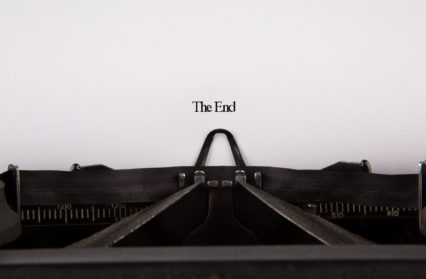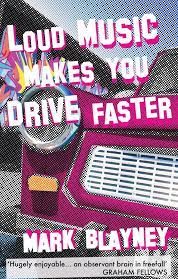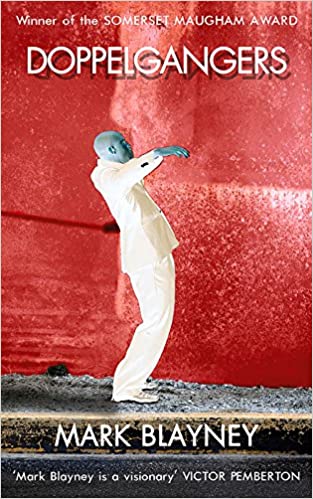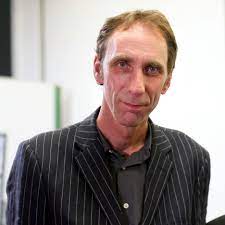After yet another recent claim that the death of the novel is nigh from high profile author Will Self, Mark Blayney breaks down the argument and finds a surprising truth. Mark Blayney is an author himself, with a number of his novels having been published.

The novel is ‘absolutely doomed’ and will become ‘a marginal cultural form’, asserted bestselling novelist Will Self at the weekend. This is not the first time that the prize-winning author of 10 novels and three novellas has told us that the novel is finished; he’s said it here, here and not forgetting here. Yes, people are still buying novels, including his, but this, alas, is on borrowed time.
Really? Are we novel readers suddenly cast as culture’s dinosaurs, placidly munching our way through leaves of outmoded information (‘stories’ – so last century, aren’t they), unaware of the impending asteroid that’s going to knock us off our three-toed feet?
We have to separate this supposition of literary oblivion into two halves. The first is financial, and the second is cultural. Let’s look at the numbers first. If Self is reasoning that the novel is on its way to zombification by studying his sales figures over the last 25 years, we can see how he might come to this conclusion. His generation is, after all, the last of those who achieved a level of success before the internet came along. Today, ‘people’ – you know, people like you and me, or ‘consumers’ as we’re fondly referred to on marketing department graphs, are buying fewer novels because there’s so much on the internet that you can read for free, and any novelist is competing with Netflix, boxsets and the rest for an individual’s precious time. Not only that, but Self’s profit figures are likely to be on an even steeper downwards diagonal than his sales figures – because people pay less for a book now than they did in 1991 when Self published his first book. (The reasons why are to be found somewhere up the Amazon).

But declining sales figures don’t = the death of the novel. It might look painful from the individual author’s bank account, whatever level of success that novelist is at, but this is absolutely comparable to what musicians have experienced since our friend the internet arrived. 25 years ago a musician would sell a certain number of CDs (or ‘tapes’, as they were called). Nowadays a large number of headphoned bodies listen to music for free online; a certain number will download it at less than albums used to sell for, and fewer still are looking at what any individual artist produces anyway because there is so much choice. The devil’s detail is that although you can make sure *your* music can’t be listened to for free, the customer doesn’t care. They’ll listen to someone who is.
What’s the answer? Musicians gravitate towards earning money at live performances, plus might sell some CDs if they sign them afterwards with a gold Sharpie. The point though is that no one is saying music is ‘absolutely doomed’ or will become culturally ‘marginal’. Authors, as they are usually equipped with good brains, are following musicians. There’s a reason for the explosion of literary festivals (thirty years ago in the UK, there were just four; now there are over 350) and for the corresponding willingness of writers to schlep up and down the country to attend them. If you want to sell a book at full price, you have to meet the reader and sign the book for them. Publishers, writers and readers all know it. This wasn’t the case in 1991 when Self got his first royalty cheque.
Interestingly, the broader industry is not just in robust health but actually growing substantially. Publishing exports from the UK leapt by 166% from 2009-14, the fastest growth is seen by any creative sector. Print sales– fiction, non-fiction and children’s titles – rose almost 9% in 2016 to £1.55bn and the total UK print book market rose 8% to a five-year strongpoint of £3bn.
And even if we remove the vulgarity of numbers from the discussion, Self’s comments are hard to fathom. Good stuff will continue to be made and appreciated whether it’s a film, a novel or an album – regardless of price and regardless of sales. (Is poetry a ‘marginal cultural form’? Let’s discuss that another day). Consider this quote (or Selfie as we could call them) which suggests that novels are declining in popularity because they are no longer needed as source material for films. ‘The problem is that now that film itself is being Balkanised – carved up, streamed, loaded on to DVDs, watched on people’s phones – it no longer needs its grease, it no longer needs the novel lying behind it. It’s a disaster for the novel, actually.’
I think this is wrong on two levels. Firstly, to say that films no longer need novels is less true now than it was even 15 or 20 years ago. To get a film made these days is so hard to do at all, producers looking for finance know that if they can point to an already-successful novel, there’s more chance of it pulling box office crowds. That’s why we have so many film adaptations of novels. And secondly – do you regularly watch films on your phone? Have you ever watched a film on your phone? (Disclaimer – I haven’t). There’s a reason for this. A phone screen is quite small, and it can be great fun to watch films on screens that are a bit bigger.
If we use the broader expression ‘screen adaptation’ rather than ‘film’ and allow TV into the discussion, Self’s views are even more quaintly divorced from the facts. Globally, what’s the biggest TV ratings success of the past few years? Let’s have a think. Unfortunately for Self, it happens to be Game of Thrones, which whatever you may think of its literary merits, is adapted not just from one novel but from a juggernaut of several gigantically successful ones. What a spoilsport for the death knell of fiction that George R R Martin is.

But let’s pause for a moment and suppose that Self is onto something – that the decline of fiction sales will lead to a terminal freefall in fiction writing (soon, soon). What *could* occur is that writing creatively goes the way that acting sometimes appears to be travelling – a preserve of the well-off. Actors from Julie Walters to Ian McShane to David Morrissey have written on how, were they starting today from working-class backgrounds, would never be able to weather the early years of few jobs and long stretches of unemployment that being an actor involves; nor put themselves through the expense of drama schools in the first place. Is the long-term prognosis for fiction therefore that we will end up not just with fewer novels but also that a higher proportion of them will be about the anguish of a storm-battered Hampstead garden and the absence of the scheduled delivery of Sauvignon for that evening’s dinner party?
Well, writers have three key advantages over actors that suggest this won’t happen. We can always pick the pen up around whatever work we need to do to live; we are not dependent on someone else giving us a job, as actors are; and we don’t have to pay for creative writing courses in order to get noticed, although it can help. (Self doesn’t think so, however, saying that teaching creative writing is ‘fatuous’.)
As evidence for his claim that fiction’s condition is terminal, Self says ‘it’s impossible to think of a novel that’s been a water-cooler moment in England, or in Britain, since Trainspotting, probably.’ My response to that would be – so what? If people in offices up and down the land are not talking about novels as they pause for refreshment while doing proper jobs instead of writing, that doesn’t mean for a moment that the industry, in general, is in trouble. A new novel by Zadie Smith, Alan Hollinghurst or Sarah Waters – to give three examples off the top of my head – is a publishing event, proudly literary and as successful on any meaningful measurement as anything Self might point to in the past. When was this golden age of the novel anyway? When Dickens was partway through writing Martin Chuzzlewit he got into a bit of a tizzy because his sales fell dramatically and he must have thought, ’pon my soul, the novel is dead. That was 1844.
For Self, the novel has gone the way of Monty Python’s parrot – it is an ex-cultural form, it is stiff, it has ceased to be. But is his viewpoint not Pythonesque in itself? ‘Famous novelist declares the death of the novel just as his new novel is published.’ Self’s newest attack emerged 16 days after the paperback publication of his latest (don’t say novel, let’s call it a 500-page prose artefact consisting of typeset words) Phone – coincidence, surely.

To be fair to Self, a journalist has just asked for his opinion and he’s given it; then because he has such a high profile, the comments are seized on and picked apart (like they’re being here). He says further down the current obituary, ‘I think writing on computers is a bit of a disaster. He’s just talking about his own experiences. Even so, if I opined that architecture or arable farming or cider or Norwegian knitwear were ‘absolutely doomed’ I would expect to be pulled apart for it.
There’s some truth in what he says, of course, there is, just not the bombastic hyperbole of how he says it. No one would deny that financially viable fiction writing, particularly literary fiction, is harder than it used to be. Fewer writers can now make a living from writing creatively. Most teach or are poor. (Or both). He’s right that reviews mean less than they used to, and he’s right that reading is under attack from our unsavoury habit of staring at smartphones on the bus. But – it was ever thus. Wasn’t television supposed to destroy the book? Didn’t the invention of the car mean no one would ever cycle again? Yes, profits are sliding. But those of us who write fiction don’t, generally speaking, do it for the yacht in the Bahamas and the solid gold typewriter. We’ll write anyway, and do other things on the side if it makes insufficient money to live on.
Not so long ago, the death of the e-book was being confidently predicted and before that, the e-book was seen as the end for the printed book. Neither doomsday scenario has quite happened (spoiler – it’s because people like reading novels), but the more Self keeps asserting that it’s going to die – one day, soon, very soon, just not yet – the more we have to brace ourselves that it’s inevitable.
Oh well. If that’s really true, Will, is it not time to take up something else, such as landscape gardening or pro-amateur wrestling? No – because the novel isn’t doomed. It hasn’t joined the choir invisible, shuffled off its mortal coil or gone to meet its maker – it’s full of life. As Self knows because he keeps writing them.
Mark Blayney is an accredited novelist. Blayney‘s novels Loud music makes you drive faster and Doppelgangers are out with Parthian.
Mark Blayney has written a handful of contributions for Wales Arts Review.
For other articles included in this collection, go here.










